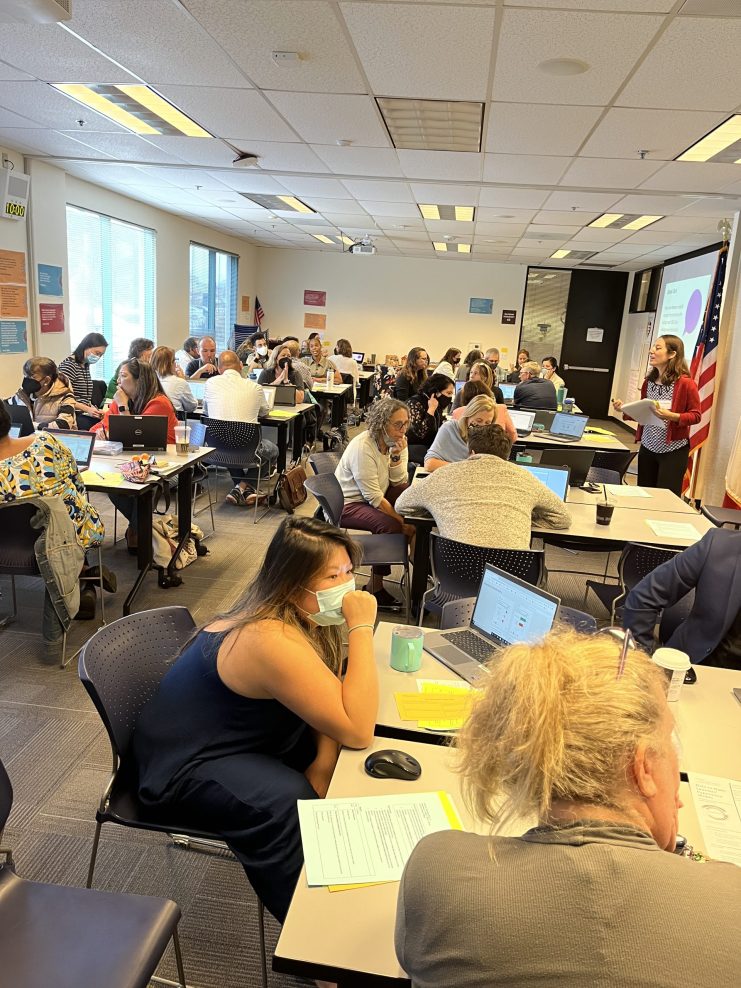
Public Learning Promotes Vulnerability and Courage
It was mid-afternoon, about 15 minutes into our Instructional Leadership Team meeting at one of our partner schools. When it was the next teacher leader’s turn to be our Public Learner, about one minute into their sharing, tears welled up in their eyes. They explained the struggles their focal student was having and how it seemed like nothing they were trying with the student was working. The student was often confused, would complete assignments incorrectly, and was resistant to asking for or receiving help. As the tears trickled down their cheeks, I reflected on the power of vulnerability.
It was so quiet in the room. I could hear my own breath and the faint sound of children playing outside. People in the room respectfully held the space and gave the Public Learner time to process the emotions they were feeling and identify what they would like help thinking about.
As the facilitator of the meeting I, sat there listening and thinking about how many times I felt uncertain about my own teaching journey. I hoped that over time, as I gained experience and insight, I would feel more certain and confident. At that moment, I understood how veteran teachers are viewed as “experts” at their school sites, and often end up on the Instructional Leadership Team as a result of their experience and expertise, and yet how important it is for them to have spaces where they can continue to learn and grow, be uncertain and how powerful it is for them to share vulnerably with others.
This veteran teacher did not initially volunteer to be a Public Learner but agreed to participate after I calmly explained how I would help them prepare ahead of time. They worried that they wouldn’t have anything to say and that they weren’t even sure what they wanted to focus on. When we met the week prior to prepare, it quickly became clear that while the teacher put on a tough facade, they cared deeply for their focal student and had already made many attempts to help the student succeed. The more we spoke, the more they realized how they were surprised that they felt uncertain about what to do next after all of these years teaching this particular grade level.
It was an honor to watch a veteran teacher model vulnerability for the rest of the Instructional Leadership Team and it gave me hope that the others would feel inspired to do the same with their grade-level teams after that meeting because they saw the power of learning and sharing publicly to impact student learning.
At Lead by Learning, we believe that vulnerability is central to leadership because it leads to continuous learning and empathy and allows educators to have conversations that help us better understand our own learning, mindsets, and practices to ultimately better serve students. We encourage Instructional Leadership Teams or any group of educators to get started incorporating moments of vulnerability using our Public Learning Practice.
That day, the teacher leader walked away with a next step and an awareness that they didn’t have all the answers and that is okay. They were empowered to have a conversation with the student to share vulnerably with them what was going on, as they had shared vulnerably with their colleagues.
Before moving into my current role as a Lead Facilitator, I realized that I practiced learning publicly throughout my career.
- As a teacher, I regularly admitted when I wasn’t sure about what decision to make with my classes and asked for their input and feedback. I learned how to admit my mistakes freely as a way of modeling my own growth mindset for students.
- As an instructional coach, I focused on asking helpful questions rather than having all the answers.
- As an Assistant Principal, I shared challenges with the staff and worked to facilitate conversations that enabled us to come to a decision collectively whenever possible.
Educators at any level need the space and support to be vulnerable and courageous. And, this space and support doesn’t always happen on its own. Schools usually need assistance creating the conditions for Public Learning to occur so that educators can continue to have a growth mindset from the beginning to the end of their careers.
Researcher and Storyteller Brené Brown says, “Vulnerability is not winning or losing; it’s having the courage to show up and be seen when we have no control over the outcome. Vulnerability is not weakness; it’s our greatest measure of courage.” I have no doubt that educators are courageous, but I hope we can work together to make spaces for educators to feel more comfortable being vulnerable together. I invite you to be both courageous and vulnerable this school year. I invite you to be a Public Learner. Get started with these three questions:
- Think about your leadership or teaching practice. What is something you are not sure about? What feels particularly confusing, complex, or sticky?
- Who can you talk to about this challenge?
- What would you like help thinking through to improve the student experience?
Interested in learning more about how Lead by Learning supports systems change through building cultures of adult learning, reach out to Senior Director Sugar Sugarman at s.sugarman@northeastern.edu. Read more about Public Learning and creating the conditions for learning in our Lead by Learning playbook.
